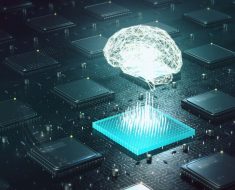In the rapidly advancing realm of artificial intelligence (AI), the push towards developing an all-encompassing, highly intelligent system known as Artificial General Intelligence (AGI) has become a pinnacle of aspiration for many in the tech field. This ambition extends to creating machines that not only match but surpass human intellect, unlocking new heights of creativity and productivity.
Despite the enthusiasm that propels this vision, skepticism persists among notable industry figures. Arthur Mensch, the CEO of Mistral AI, one of Europe’s leading AI providers based in France, offers a contrarian stance on AGI. In a recent fundraising triumph, Mistral AI secured over two billion dollars to pursue open-source language models, a venture that aligns with the pragmatic development of AI but steers clear of the quest for AGI.
Mensch contrasts the pursuit of AGI to an attempt to mirror a divine creation, an objective he finds discomforting and unpersuasive. As a professed atheist, he draws a parallel between his disbelief in a deity and his doubts regarding the feasibility of AGI. His reasoning is rooted in the notion that endowing machines with god-like intelligence is more fiction than a science, a belief that shapes his company’s strategic direction away from AGI.
This counterpoint to mainstream AI goals highlights the diversity of thought existing within the tech community, prompting discussions on the ethical and practical limits of AI development as we continue to push the boundaries of technology.
Current Trends in Artificial Intelligence
The field of artificial intelligence is currently witnessing significant growth, with emphasis on areas such as machine learning, deep learning, natural language processing, and robotics. Companies across various industries are integrating AI into their operations to improve efficiency, automate tasks, and make more informed decisions. There is a strong push for AI systems that can perform specific tasks exceptionally well, known as Artificial Narrow Intelligence (ANI), which is seeing widespread adoption.
Forecasts for Artificial General Intelligence
Predicting the arrival of AGI remains speculative, with estimates ranging from a few decades to a century or more. The development of AGI depends on breakthroughs in understanding human cognition, as well as advances in computing power and algorithms. However, progress towards AGI is incremental and contingent upon overcoming substantial technical and ethical challenges.
Key Challenges and Controversies
One of the key challenges of AGI is creating an AI that possesses transfer learning abilities, enabling it to apply knowledge from one domain to another, akin to human intelligence. Ethical considerations also pose a significant barrier, with concerns about accountability, privacy, job displacement, and the potential misuse of AGI.
Controversies include debates about the plausibility of creating a conscious machine and the implications it would have for society. The control problem, which deals with ensuring that AGI would act in humanity’s best interests, is of particular concern to many experts.
Most Important Questions Relevant to AGI Skepticism
1. Can AGI be developed responsibly with controllable outcomes?
2. What are the implications for humanity if AGI surpasses human intelligence?
3. How will AGI impact employment and the global economy?
4. What are the ethical considerations of creating a machine with general intelligence?
Advantages and Disadvantages of AGI
Advantages:
– The potential for breakthroughs in science, medicine, and technology.
– Solution of complex global challenges that are currently beyond human capacity.
– Improvement of quality of life through automation and personalized services.
Disadvantages:
– Existential risks if AGI systems act in ways not aligned with human values or control.
– Economic disruption due to job displacement and the potential for increased inequality.
– Ethical issues, including the rights of an intelligent system and privacy concerns.
To stay updated with the latest trends and controversies in artificial intelligence, interested readers can visit various reputable sources online. For instance, information on AI developments can be found at the website of the Association for the Advancement of Artificial Intelligence at AAAI. For insights into market trends and forecasts, one might visit a leading insight and analytics provider in the technology space, such as Gartner. For discussions on the ethical implications and challenges of AI, the Institute for Ethics in AI at Oxford Internet Institute shares valuable resources. It’s important to keep abreast of these resources to understand the constantly evolving landscape of artificial intelligence.





